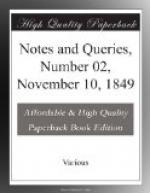The “bibliographic project” I shall rejoice {20} to see carried out; and though neither an unemployed aspirant nor a fortunate collector (of which class I hope many will be stimulated by the proposition), yet, as I once took some trouble in the matter, I should be happy to contribute some Notes then made whenever the plan is matured and the proposed appeal is made—provided (I must add, and to you I may add) I can find them.
The Liber Sententiarum was printed by Limborch, at Amsterdam, in 1692. It forms the greater part, as, indeed, it was the occasion, of his folio volume, entitled “Historia Inquisitionis cui subjungitur Liber Sententiarum Inquisitionis Tholosanae ab anno Christi Cl[*C]CCCVI ad annum Cl[*C]CCCXXIII.” Gibbon, in a note on his fifty-fourth chapter, observes that the book “deserved a more learned and critical editor;” and, if your correspondent will only place the Book of Sentences before the public in a readable form, with a map, and (by all means) a few notes, he will be doing a great service to all persons who take an interest in ecclesiastical history, or, indeed, in history of any kind. In the year 1731 Chandler published a translation of the History of the Inquisition, with a long Introduction of his own, but did not meddle with the Book of Sentences, except so far as to introduce into the text of the History some passages from it, which Limborch (as he appended the whole book) did not think it necessary to quote. I remember seeing the MS. in the British Museum within these ten or twelve years, and, according to my recollection, it was accompanied by papers which would furnish an interesting literary history of the volume. I hope your correspondent will give us farther information.
N.B.
[Mr. Brooke, of Ufford, has also kindly replied to the Query of INQUISITORIUS, by referring him to Limborch.]
* * * * *
QUERY AS TO REFERENCES.
Sir,—May I be permitted to suggest one way in which you may be of great service to many literary men, and indeed to the cause of literature in general; and this, too, without much trouble to yourself? Would you be willing to receive “Queries” respecting references? They frequently puzzle those who are engaged in literary works, and indeed those who are merely readers, and who have not access to public libraries or the manuscript treasures of the metropolis and the universities. If, for instance, a clergyman or squire, interested in the history of his parish, should find in the county historian something which his own local or genealogical knowledge leads him to think erroneous, vouched for by a reference to the Cotton or Harleian MSS., might he apply to you? It may be supposed that you are not very far from some one of the great fountains of information, and have easy access to all; and it is probable that you might not only do a personal favour to the inquirer, but confer a benefit on the public, by correcting an erroneous statement. Of course you would subject yourself to unreasonable requests, but the remedy would always be in your own hands.




